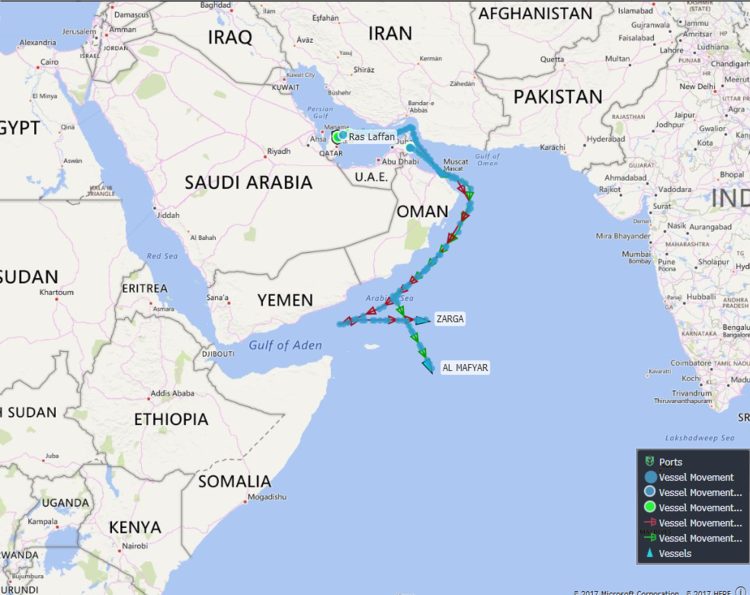
European energy markets started to feel the impact of the escalating diplomatic row in the Middle East after natural gas prices soared when tankers full of Qatari fuel abruptly changed course.
Two ships bound toward Europe veered course Thursday, taking them away from the Red Sea and Suez Canal, the transit route for gas into the Mediterranean and a point of focus amid the Qatari crisis. Front-month gas in the U.K. jumped the most since January after the turnaround surprised traders, who had been bearish the fuel according to a survey earlier in the day, before trading little changed Friday.
European gas traders count on Qatar, the region’s biggest LNG supplier, to refill storage sites depleted after the key winter heating season. The vessels may be sailing around Africa to Europe to avoid the Suez Canal, according to Paris-based cargo-tracking company Kpler SAS.
The LNG tankers, the Zarga and Al Mafyar, turned around off the coast of Yemen, according to ship-tracking data on Bloomberg. Both ships were expected to go to the U.K., and sailing round the Cape of Good Hope would delay their journeys by five to 10 days, Kpler said by email. The Zarga’s easterly course may be an attempt to avoid high-risk areas off Somalia, it said.
Qatar’s relations with its Gulf Arab neighbors Saudi Arabia, the United Arab Emirates and Bahrain deteriorated Monday when the three countries, along with Egypt, severed diplomatic ties as well as land, sea and air travel with Qatar. The four accuse the small Gulf nation, the world’s biggest seller of LNG, of supporting extremist groups.
The shipping industry is likely to feel the impact of the crisis as entry bans on vessels from Qatar at some ports will force shippers to find alternative routes to refuel and tweak schedules, potentially increasing costs and causing delays in LNG deliveries, according to FGE.
“We may start to see some inefficiencies in scheduling/routing if the issues persist, which could increase ton miles as ships are forced to bunker elsewhere or take suboptimal routes,” Jamie Buckland, head of investor relations at GasLog Ltd., an LNG ship owner, said by email Friday. “The major impact would be if the Suez Canal were closed to Qatari vessels but there is no evidence that this will happen.”
U.K. front-month gas Thursday rose 4 percent to 37.46 pence per therm ($4.75 a million British thermal units), the biggest gain since Jan. 30 on ICE Futures Europe. It rose 0.2 percent Friday and is still about 20 percent below its five-year seasonal average.
Qatar exported 79.62 million tons of LNG last year, or 30 percent of global supply, according to the International Group of Liquefied Natural Gas Importers, known by its French acronym GIINGL. The nation is equidistant from Europe and Asia, supplying both, while the Middle East accounted for about 10 percent of its volumes last year, according to GIIGNL.
To get to Europe, Qatari cargoes mainly go via the Suez Canal, a faster route than around Africa.
“Qatar shipping should retain use of the Suez Canal, which is governed by international agreements,” the Oxford Institute for Energy Studies said this week in a report. “But Egypt could reduce the canal-fee discount offered to LNG ships, making transits more expensive for Qatari LNG carriers and reducing Qatari LNG competitiveness in the European market”
Recommended for you
